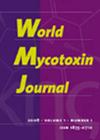第一届霉菌毒素国际会议召开 50 年后,从 16 届世界霉菌毒素论坛中汲取的经验教训
IF 2.2
4区 医学
Q3 FOOD SCIENCE & TECHNOLOGY
引用次数: 0
摘要
为了开发农民和食品加工者负担得起的实用工具,有效管理食品和饲料链中霉菌毒素污染的风险,科学家和相关方仍需不断开展研究并建立跨学科网络。为了促进采取适当行动,已经启动了专题实验室间项目,成立了专业网络组织,创办了专门期刊,并组织了霉菌毒素会议。世界霉菌毒素论坛(WMF)已成为霉菌毒素方面领先的系列国际网络会议,食品和饲料行业的代表与来自政府、食品管理机构、食品和饲料行业的代表以及世界各地的大学和其他研究机构的人员在这里会面。世界霉菌毒素大会已逐渐从与食品和饲料相关的技术议题转向国际和监管问题,以及基于真菌和植物遗传学的缓解战略、基于大数据的决策支持工具和气候变化下的可持续解决方案。这些年来,每次世界微生物大会的最后一天,大会主席都会将大会得出的结论总结为 "五大经验教训"。1972年,国际理论化学和应用化学联合会(IPUAC)举办了第一届霉菌毒素国际会议,50年后的今天,本文汇编了2001年至2022年期间举办的16届世界霉菌毒素大会和世界霉菌毒素大会/国际理论化学和应用化学联合会联合会议上提出的所有 "五大经验教训"。自第一届霉菌毒素国际会议以来,在预防、减少和控制霉菌毒素方面取得了很大进展。然而,要解决霉菌毒素污染的复杂问题,特别是在气候变化和其他全球性挑战即将来临的情况下,仍然需要持续关注和进一步努力。本文章由计算机程序翻译,如有差异,请以英文原文为准。
Lessons learned from 16 editions of the World Mycotoxin Forum 50 years after the first international conference on mycotoxins
On-going research and interdisciplinary networking among scientists and stakeholders are still needed for the development of affordable and practical tools for farmers and food processors to efficiently manage the risk of mycotoxin contamination along food and feed chains. In order to facilitate appropriate actions, thematic interlaboratory projects have been initiated, professional networking-organisations have been founded, dedicated journals have been started and mycotoxin conferences have been organised. The World Mycotoxin Forum (WMF) has established itself as a leading international networking conference series on mycotoxins where food and feed industry representatives meet with representatives from government, food authorities, food and feed industry and with people from universities and other research institutions from around the world. The WMF has gradually moved from food and feed related technological topics to international and regulatory issues and to mitigation strategies based on fungal and plant genetics, big data based decision support tools and sustainable solutions in view of climate change. Over all these years, the conclusions made from each WMF have been summarised by the general conference chair(s) as the ‘top 5 lessons learned’ on the last day of each conference. 50 years after the first international conference on mycotoxins organised by IPUAC in 1972, this article has compiled all ‘top 5 lessons learned’ presented at the 16 editions of the WMF and joint WMF/IUPAC events organised between 2001 and 2022. Since the first international conference on mycotoxins, much progress has been made in the prevention, reduction and control of mycotoxins. However, continuous attention and further efforts are still needed in order to tackle the complex issues of mycotoxin contamination especially in view of climate change and other global challenges on the horizon.
求助全文
通过发布文献求助,成功后即可免费获取论文全文。
去求助
来源期刊

World Mycotoxin Journal
MYCOLOGY-
CiteScore
4.60
自引率
5.00%
发文量
25
审稿时长
>12 weeks
期刊介绍:
''World Mycotoxin Journal'' is a peer-reviewed scientific journal with only one specific area of focus: the promotion of the science of mycotoxins. The journal contains original research papers and critical reviews in all areas dealing with mycotoxins, together with opinions, a calendar of forthcoming mycotoxin-related events and book reviews. The journal takes a multidisciplinary approach, and it focuses on a broad spectrum of issues, including toxicology, risk assessment, worldwide occurrence, modelling and prediction of toxin formation, genomics, molecular biology for control of mycotoxigenic fungi, pre-and post-harvest prevention and control, sampling, analytical methodology and quality assurance, food technology, economics and regulatory issues. ''World Mycotoxin Journal'' is intended to serve the needs of researchers and professionals from the scientific community and industry, as well as of policy makers and regulators.
 求助内容:
求助内容: 应助结果提醒方式:
应助结果提醒方式:


